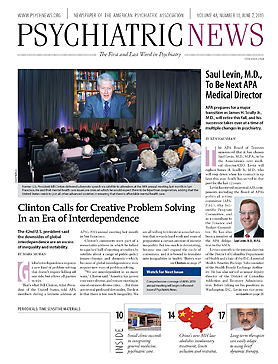If insurance companies are going to treat mental and physical illnesses differently, they must justify the disparities using clinically appropriate standards.
That’s what the U.S. District Court for the District of Vermont said in the case C. M. v. Fletcher Allen Health Care, Inc.—one of the first legal opinions to address interpretation of the Mental Health Parity and Addiction Equity Act of 2008 (MHPAEA). The court’s ruling in the case was in response to a motion to dismiss the case filed by the defendant insurer, Fletcher Allen Health Care. The effect of the ruling is to ensure that the plaintiff’s case can go forward.
But the court’s decision is important, said APA General Counsel Colleen Coyle, because it “squarely puts the burden on the insurance plan to demonstrate that treatment of mental health benefits in a manner that is not comparable to treatment of medical/surgical benefits is justified by recognized and clinically appropriate standards of care.”
The insurer had argued that the federal parity law requires patients to prove not just that mental health benefits were treated differently from other medical benefits, but to demonstrate that “no clinically appropriate standard of care would permit a difference.” That is, the insurer was arguing that the case should be dismissed because it is the patient’s responsibility to prove that the insurer’s action was not justified by clinically appropriate standards of care.
Not so, said the court, which ruled instead that it is the insurer that bears the burden of proof for explaining its treatment decisions. “[T]he Parity Act was promulgated to eliminate impermissible disparity in the benefits afforded for mental health and substance abuse disorders when compared to those afforded medical/surgical conditions,” the federal court said. “It stands to reason that plan administrators would also bear the burden of establishing under the Parity Act, why mental health and medical benefits are treated differently based upon divergent clinical standards.”
Coyle told Psychiatric News, “Mental health and substance disorder patients have a right to know whether they are being treated differently than patients with other physical or surgical issues, and if so, on what clinical grounds the insurance companies justify that difference.”
In the Vermont case, the plaintiff patient—identified only as “C.M.”—alleges that the insurer violated the MHPAEA by requiring preapproval for routine mental health services but not for other medical services; by conducting concurrent reviews of mental health services but not requiring such reviews for other medical services; and by initiating automatic review processes triggered by a fixed number of visits for mental health services but not for other services.
The court denied Fletcher Allen’s motion to dismiss the claim, and therefore C.M. will have the opportunity to prove that these differences in handling mental health claims violated federal law. If the patient does so, the court should find that the insurer violated the MHPAEA unless the insurer can demonstrate that these disparities are justified by recognized and clinically appropriate standards of care, Coyle said.
APA assisted the plaintiff’s counsel in developing the MHPAEA-based arguments in this case. APA has filed another lawsuit against insurers Anthem and WellPoint in Connecticut and is in the process of challenging several other insurance carriers it believes are violating mental health parity laws or improperly using CPT codes for services provided by psychiatrists (Psychiatric News, April 5.
The lead attorney representing C.M., Alison Bell, of the law firm Langrock Sperry & Wool, said in a statement, “Mental health parity is an important lifeline for my client, who was denied benefits for medical care desperately needed in order to live a healthy life. We are grateful for APA’s assistance with MHPAEA issues.”
Last month, former member of Congress Patrick Kennedy hosted a roundtable discussion in New Haven, Conn., at which the plaintiff in the Vermont case spoke—along with psychiatrists, other patients, mental health advocates, and political leaders—about mental health parity and the need for patients to speak out publicly to ensure that the vision that propelled passage of the MHPAEA is realized.
APA Medical Director James H. Scully Jr., M.D., praised the plaintiff for taking action and emphasized that the Vermont case is an important one. “APA applauds plaintiff C.M. and others who spoke at the roundtable…for having the courage to stand up for the right to care,” he said in a statement. “We look forward to the day when parity is fully realized and those with a mental illness and/or substance use disorders can expend their energy and resources conquering the illness, rather than battling the insurance companies for the coverage to which they are entitled and for which they and their employer have paid.” ■

